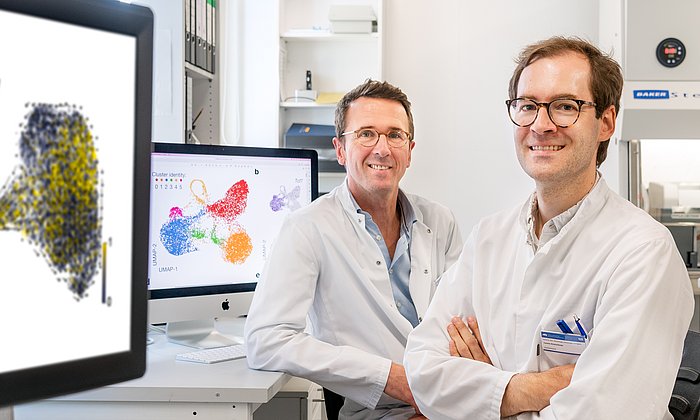World Cancer Day on February 4, 2023
Cancer research at TUM

Translation: From basic research to application
A team at TUM has discovered a mechanism which provides indications of why plasma cells become aggressive in some incurable forms of blood cancer. Prof. Florian Bassermann and his team have identified a particular protein which could be responsible for the development of the cancer cells. If it can be successfully deactivated, it could be possible to stop the cancer before it actually develops. The researchers are now intensifying the search for medically active substances which could achieve this. Prof. Bassermann is the director of the Clinic and Polyclinic for Internal Medicine III (Hematology / Oncology) as well as a researcher at TranslaTUM, TUM’s center for translational cancer research. At TranslaTUM, researchers from medical research, natural sciences and engineering work together to make results from basic research available to application. Read the full text.
Biotechnology: organoids help in understanding cancer
Researchers at the Technical University of Munich (TUM) have developed a model system that can be used to precisely track the growth steps and three-dimensional arrangement of pancreatic cancer cells. The team succeeded for the first time in creating an organoid, i.e. a three-dimensional cell culture, that includes the complex structure of pancreatic tumors. These structures may provide the basis for testing and developing therapeutic approaches. Read the full text.
Interdisciplinarity: quantum mechanics for medical imaging
Tthe visualization of metabolic processes in cells can help to detect cancer in early stages. In the future, a so-called quantum hyperpolarizer may facilitate this by amplifying the signals of injected molecules during PET-MRT scans. An interdisciplinary research team including TUM is working to advance the development such a substance making use of quantum physical laws. Read the full text.
Entrepreneurship: better therapies through nanotechnology
The TUM spin-off Plectonic Biotech has developed a nanoswitch that binds immune cells to tumor cells. The goal is to facilitate the development of immunotherapies that target tumors specifically and have fewer side effects. The Federal Agency for Disruptive Innovation SPRIND will provide funding in the coming years.The spin-off was promoted by the TUM Venture Lab Healthcare. Each of the TUM Venture Labs specializes in an important technological field and offer direct access to cutting-edge research, specific technical infrastructure, customized training programs, expertise for the respective market, and global networking with the industry and capital providers. Read the full text.
Immunology: using the body's natural defense for therapies
Researchers at the Institute for Medical Microbiology, Immunology and Hygiene have discovered a new population of immune cells. These celly may play an important role for immunotherapy using checkpoint inhibitors. The discovery may explain why immunotherapy fails in some people and could lead to the development of more effective new therapies for cancer. Thanks to the expertise of the institute and other research groups at TUM, innovative cancer therapies can be offered at Klinikum rechts der Isar, for example with genetically modified immune cells. The two Munich university hospitals closely cooperate in the Comprehensive Cancer Center Munich which enables particularly good care for cancer patients. Read the full text.
Hightech: forecasting the risks of surgery
What is the risk for patients to lose their ability to speak when undergoing brain tumor surgery? To find out, researchers at TUM’s Klinikum rechts der Isar are analyzing the brain as a network. Project leader Prof. Sandro Krieg is Senior Physician at the Neurosurgery Clinic as well as one of the principal investigatrors at TUM’s Munich Institute of Robotics and Machine Intelligence (MIRMI) . Read the full text.
Student competition: Munich team wins gold medal
A Munich student team won a Gold Medal in the world's largest academic competition for the field of Synthetic Biology with their project aimed at improving cell therapies against cancer. The group from TUM and LMU, led by Prof. Matthias J. Feige, was the only German team to finish among the top 10 out of 180 student projects in the undergraduate age category. The students created an open source database of receptors that immune cells use to communicate with each other and won the award for best software tool. Read the full text.
Technical University of Munich
- Paul Hellmich
- paul.hellmich@tum.de
![[Translate to English:] [Translate to English:]](/fileadmin/user_upload_87/_processed_/b/3/csm_istock-824709646_16x9_fda9aaef34.jpg)





